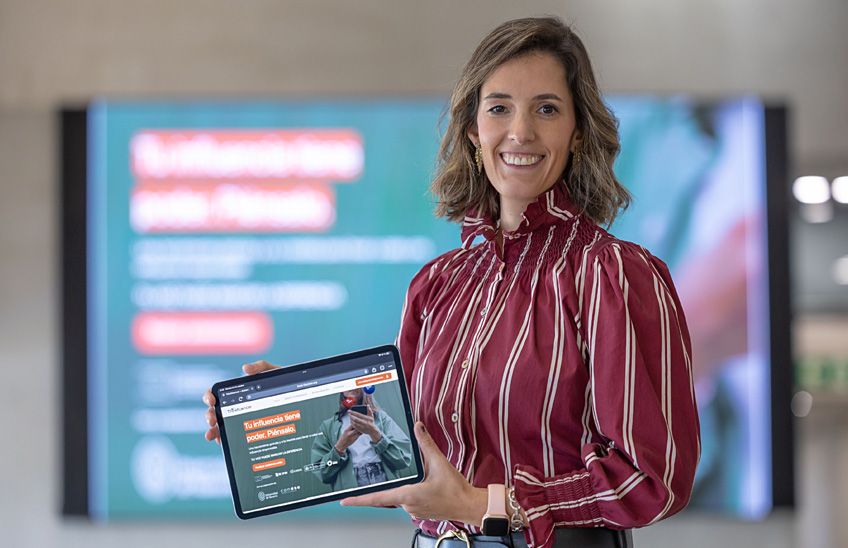Thinkfluencer and the "White Paper on Responsible Influence 2025" promote a model of responsible influence and emotional well-being in the digital environment.
The project, driven by the University, iCmedia and Conese, promotes a new digital culture based on accountability, transparency and the emotional well-being of content creators.

PhotoManuelCastells/Patricia SanMiguel, principal investigator and head of the project at the University of Navarra.
28 | 10 | 2025
The second edition of the "White Paper on Responsible Influence 2025" and Thinkfluencer, the first free self-assessment tool for responsible influence and emotional well-being of content creators, were presented in Madrid.
Both initiatives make up a pioneering project that seeks to strengthen a more ethical, transparent and emotionally sustainable influencer ecosystem, in a context in which influencer marketing will reach US$32.55 billion by 2025 and in which more than 200 million creators generate content worldwide.
The project has been promoted by iCmedia, the University of Navarra and Conese, with the support of the European Commission through the SIC-Spain 4.0 project (Safer Internet Center Spain 4.0), co-financed by the European Union (Project: 101158532) and the Ministry of Social Rights, Consumption and Agenda 2030.
Patricia SanMiguel, principal investigator and head of the project at the University of Navarra, said that "the White Paper on Responsible Influence 2025 has brought together all the players in the influencer marketing ecosystem. It has been an opportunity to understand how a real collaboration between everyone is the basis for achieving responsible influence, based on responsibility and authenticity and that takes into account the emotional well-being of content creators. The tool is the materialization of that responsible influence. We have not only defined the criteria or concepts that define responsible influence, but we have also developed, together with CONESE, how to measure this responsible influence, also focusing on emotional well-being. Thanks to all the professionals who participated, without whom the White Paper and the self-assessment tool would not have been possible".
Marta Pellico, vice-president of iCmedia emphasizes that "the dialogue that has shaped this second edition shows that self-regulation, education and multi-sector cooperation are more effective than mere vigilance. Building an ethical, transparent and emotionally sustainable influence requires that we all assume real co-responsibility. From iCmedia we will continue to promote this shared work, convinced that trust, like good communication, is built every day, with rigor, respect and purpose".
The White Paper on Responsible Influencing 2025: a collective reflection of the sector
The Second Edition of the "White Paper on Responsible Influence 2025" has been the conceptual basis for the development of the self-assessment tool. The book is the result of a broad exercise of collective reflection that has involved more than 65 in-depth interviews with representatives of all the agents of the digital ecosystem that build influencer marketing: institutions, regulatory bodies, agencies, platforms, media, professional associations, mental health experts and content creators.
Participants include public institutions, influencer marketing organizations, regulators, media, specialized agencies, entities linked to children and youth, emotional well-being experts and content creators, among others.
The book gathers concrete contributions to guide the evolution of the sector towards a more ethical and sustainable model:
Analysis of the evolution of influencer marketing stakeholders, with special attention to new realities such as kidfluencers and virtual influencers.
2. Study of the emotional well-being of creators, which addresses the psychological pressure derived from constant exposure, dependence on external validation, job insecurity or cyberbullying, and proposes strategies for resilience, training and design of safer digital environments.
3. Recommendations to sector stakeholders to consolidate responsible influence.
4. Presentation of the Indicators of Responsible Influence 2025-2026, which systematize criteria in three dimensions: transparency, responsibility and emotional well-being, applicable to brands, professionals and public policies.
5. Launch of Thinkfluencer as a practical self-assessment tool.
6. Update of the ethical decalogue for influencers and content creators.
A tool to measure accountability and digital well-being
Thinkfluencer helps content creators, agencies and brands identify best practices, detect areas for improvement and build a community based on trust. A commitment to ethics, transparency and accountability.
The tool consists of two main elements:
Self-assessment questionnaire: dynamic questionnaire that allows influencers to analyze their digital activity through two dimensions - Responsible Influence and Emotional Well-being - and through which a personalized rating thermometer is obtained.
2. Personalized recommendations report that helps the content creator understand how he is impacting his community and how his influence is related to his emotional well-being. It is a clear and practical read on how the creator's influence impacts his audience and himself and provides guidelines to improve both dimensions.
A meeting with industry leaders
The presentation event, held on Tuesday, October 28, brought together key voices of the digital communication ecosystem and leading personalities in the sector, from the academic, legal and digital communication fields: Manuel Linares, Communication Director of El Hormiguero, Miguel Ángel Arias Carrascosa, Deputy Director General for Analysis and Strategy of Agenda 2030, Sergio Barreda, President of the Association of Influencer Marketing Agencies of Spain (APIDE), Cristóbal Gázquez, President of the Spanish Union of Creators (UEC), José Domingo Gómez Castallo, President of Autocontrol, Marta Torregrosa, Director of ISEM-University of Navarra, Marta Pellico, Vice President of iCmedia, Patricia SanMiguel, Head of the Responsible Influence Project, Pilar de Castro-Manglano, Specialist in Adult, Childhood and Adolescent Psychiatry at the University Clinic of Navarra and the influencer Carmen Osorio.
